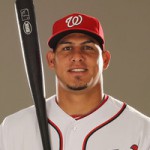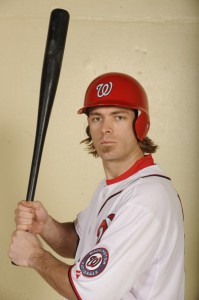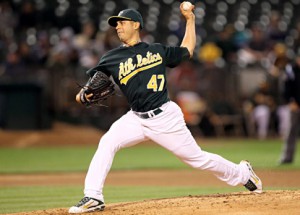Here’s Boswell’s 7/5/11 chat. As always, I read the question, write my own answer then interpret Boswell’s answer. All questions are paraphrased from the chatroom for clarity here.
Q: Should the Nats move Espinosa to Short, making room for Rendon?
A: I believe the Nats may eventually consider moving Danny Espinosa to shortstop to make way for either Anthony Rendon but perhaps Steve Lombardozzi in the near future. For the beginning of 2012 season? I doubt it. Yes, Ian Desmond has been hitting ridiculously badly, but he’s a plus defender at Short with an absolute gun of an arm. He’s cut way down on errors and mental mistakes. We all believe Espinosa can handle the position (he was a grade-A short stop at Long Beach State), but the right answer may be to give Desmond one more full season before pulling the trigger. Any move would be done in a spring training presumably. (Boswell more or less agrees, saying Lombardozzi will be a full time MLBer, Desmond moves too much in the box, and that Espinosa has better hands but not as much range).
Q: Did Harper skip high-A because of Potomac’s field situation?
A: Great question. Personally I believe Potomac’s field disaster factored into the situation. Perhaps part protection of Bryce Harper (who was promoted to AA over the weekend and went 2/3 in his AA debut), part penalization of the ownership/management of the Potomac franchise (which they must believe has botched this badly, to be giving away home dates). Of course there is the plain fact that Harper, despite his young age, held his own against AA-calibre talent and higher in 2010’s Arizona Fall League and he may just be ready for AA. (Boswell punts on the question, quoting Rizzo who said “the field is fine, it had nothing to do with it.” A non-answer.)
Q: What are the chances Michael Morse wins the “last man standing” all-star vote?
A: I’ll say slim, based on who he’s up against (here’s a link to the voting). Ethier, Helton, Victorino, and Ian Kennedy are the candidates. I’d guess that either Victorino or Helton wins, though Ethier is a deserving candidate. Nobody’s heard of Michael Morse unfortunately. (Boswell thinks Philly fans will vote in Victorino).
Q: Is Ryan Zimmerman’s new throwing motion working?
A: It seems not; if anything its causing even more problems. Zimmerman used to make most of his errors on relatively routine throws over to first; if he’s making a throw under duress it is usually spot on. So the new motion is designed to remove the scatter-arm throws. But now, instead of making a routine throw and it getting into his head, he’s got this new motion into his head. I can’t see how its an improvement. For me when playing the answer was always to go to a side arm motion to gain accuracy but I was playing from middle-infield positions that didn’t require long, overhand throws like what the third baseman has to do. (Boswell thinks it is working and that Zimmerman needs a bit longer to get comfortable with it).
Q: Was it too early, too late or the right time to promote Harper?
A: From a productivity standpoint it was probably too late; he clearly owned how-A pitching after just a few weeks. But, from a “learning how to be a baseball player” standpoint its just right. Finish out a half, a playoff-run, get a bunch of road trips in and get used to playing day after day. Now he can move up and get challenged by better pitching. Personally I would have put him in high-A for an incremental improvement. Run him up to AA if he dominated in Potomac, else start him at AA next year with an eye to move him quickly to AAA. I think there’s value in growing into your role. (Boswell says it was the right time to promote, but not to which level, and then compares Harper’s minor league splits to A-Rods and Ken Griffey Jr’s).
Q: How much credit should we give Rizzo the GM for 4 specific moves that paid off (Ramos-Capps, Willingham trade, letting Dunn walk and failing to get Greinke)?
A: I give Rizzo some good, some bad for his moves over the past year or so. The Ramos for Capps trade was spectacular. The Guzman trade (something for nothing) was quality. His purchase of Bixler has turned out well. I think we got fleeced on the Willingham deal frankly and think this team could have used the offense. Dunn was never going to stay here so I don’t know how much credit you can give Rizzo for purposely picking up the draft picks. He overpaid badly for Werth (for reasons that have been discussed ad-naseum here and were bigger than just the player). I liked the acquisition of Gorzelanny for what we gave up. His two rule5 draft picks were garbage. Cora and Nix on minor league contracts has turned out great. He got a decent AA starter for Gonzalez but a middling low-A infielder for Morgan. He wanted and was going to pay for Greinke, who i think is vastly over-rated, had one good season and is by no means an “ace” in this league. He’s a solid guy but not a $100m pitcher. (Boswell points out the Hanrahan-Burnett deal is looking bad for the Nats; I’ll defend the Nats there since Hanrahan was SO bad for us. Boswell also mentions Aaron Crow for some reason; that non-signing was 110% on Bowden, not Rizzo).
Q: Are Nats buyers or sellers at the trade deadline?
A: This answer will vary day by day between now and 7/31 honestly. If the Nats go on a 5 game losing streak they’re selling like mad. Right this moment, they’re probably doing nothing, stuck into inactivity by virtue of their .500 record and proximity to the wild card race. (Boswell agrees, saying the team’s record on July 28th is what matters).
Q: Will the Nats over pay and sign Marquis and Livan for next season?
A: God I hope not. Marquis should be jettisoned to make way for Strasburg’s return. Livan is worth 1.5-2m/per, but not much more. If he demands more cut him loose. Livan at this point is merely a holding over pitcher until our farm system prospects pan out. (Boswell seems to think that Detwiler could make an able replacement for Marquis, either this August/September or later on).
Q: Is Werth unable to get around on fastballs?
A: I don’t have enough video evidence to offer an opinion. Boswell says he’s just trying too hard, his mechanics are out of whack.
Q: Thoughts on the all-star rosters?
A: Havn’t even looked at them. Looking them up to comment here. Don’t care really; the all-star rosters will always have too many Red Sox, too many Yankees and too many Asians from ballot-box stuffing. I can’t stand the “every team must be represented” issue, which dilites the team and gives players cheap all star appearances. I think the fact that the world series home field advantage depends on this exhibition is beyond ridiculous. So doing a 2500 word column nit picking the all-star selections is just July column filler for most baseball writers. For me its like complaining about the BCS: its never going to change. Let other people bitch about the fact that Derek Jeter has basically been awful this year, not the best.
I will say that the manager’s selecting the pitchers is ridiculous. Yes Vogelsong has had a great season but he’s not who the fans want to see in the all star game, nor is he one of the best 15 pitchers in the league. Picking middle relievers? Ridiculous as well.
(Boswell says he likes the rosters and won’t waste an answer on what could give him an easy column!)
Q: How much money is Pujols’ injury- and poor-performance season costing him? Would he take a 1-year deal to regain value?
A: Great question. I think Pujols poor season has already cost him a shot at a 10-yr/$300M contract that many spoke of. He’s clearly going to lose years and value. I think he deserves a 7yr deal that pays him more per-annum than A-rod, and it may be what he’s shooting for. I do not think he’ll take a one-year deal. Too much can go wrong, too risky. Even if he doesn’t get the years and money he seeks, you cannot blow the opportunity to guarantee hundreds of millions of dollars. (Boswell wouldn’t even give him 7 years right now).
Q: Could Lombardozzi come up and force a replacement of Desmond in 2011?
A: No way. There’s little value in yanking Desmond in mid-august, forcing Espinosa to move to shortstop with no work all year and possibly disrupt a Rookie-of-the-Year season AND do the 40-man move to add Lombardozzi just for a few games in the bigs. (Boswell answered by defending Desmond, calling him a 10-year career shortstop. He needs to start hitting though).
Q: Comments on the Soriano “hit” that scored 2 runs?
A: An official scorer just can’t give Bernadina an error on a ball that drops in front of him, despite it clearly being a fielding mistake. Its one more piece of evidence showing how inaccurate ERAs are for pitchers. Zimmermann had Soriano popped up and was out of the inning; suddenly he’s given up 2 earned runs that he didn’t deserve. To me, it looked like Bernadina lost the ball in the over-cast sky. (Boswell points out that the play perfectly encapsulates why the team doesn’t think Bernadina is the long term answer in center. Well, duh, I could have told you that was the case long before this play!)
Q: Why aren’t the Nats hitting?/How much accountability does Rick Eckstein have in this situation?
A: Honestly, I’ve never thought that a hitting coach really could impact what a major leaguer could do. Be it out of respect, or lack thereof. If everyone thinks Werth’s mechanics are out of whack, why hasn’t he fixed them? Its an easy video fix right?
Werth is trying too hard. Espinosa’s babip is awful. Desmond just isn’t that good. Morse is good but has holes that pundits/scouts like Keith Law think are going to get exposed. Zimmerman is just getting back in the saddle. Willingham and Dunn (despite what they’re doing in 2010) were stable, high OBP forces in this lineup and when they left, there was major disruption. LaRoche has always been a slow starter, complicated (as we eventually found out) by a bad shoulder injury. (Boswell ducked the question as I have, but gives some interesting analysis of just how not-so-bad the team really is offensively right now).
Q: Why is Nyjer Morgan suddenly good again? Same question for Kearns, Felipe Lopez and (possibly) Werth?
A: Morgan needed a change of scenery, and has taken advantage of it. Same goes for Hanrahan, and in that respect that trade has worked out well for Pittsburgh. Kearns never wanted to be traded here; he is from Kentucky and liked it in Cincinnati. Once he got his balloon payment here he never earned the contract. Lopez is a special case; a good player with an awful attitude, and he’s earned a one-way ticket out of several towns by now. I wouldn’t put Werth in any of these classes; he’s hard-nosed, plays hard, doesn’t play dirty, doesn’t show-boat, and takes his craft seriously. (Boswell just says that change of scenery is sometimes good, without throwing (especially) Lopez under the bus).
Q: Why is Sean Burnett still on the roster?
A: True, his 2011 numbers have been pretty bad. But one really bad game can make 3 weeks worth of good look awful. Look at his game logs; he’s been pretty good lately except for one or two blow ups. The team needs a loogy, Burnett actually gives them more than just a one-out guy, and he was pretty good last year. Way too early to give up on him, to say nothing of the fact that there’s very little in AAA or even AA to replace him. We’re still trying to replace our actual LOOGY Slaten, signing JC Romero and possibly looking at Severino or even Chico at some point. (Boswell agrees).
Q: What are we going to do with Rendon?
A: Wait for him to prove he belongs, then find a spot. He hasn’t signed yet, could get injured again and be a total bust, or he could hit like the 2nd coming of Alex Rodriguez in the minors and shoot up to earn MLB at bats inside a year. If he forces his way onto the roster then you make room for him. Install him at 2nd, move Espinosa to short. Or, put Rendon in left and keep your current MI. Maybe Zimmerman wants out of town after 2013 and Rendon naturally moves to third. Maybe the entire team gets hit by a bus and we start over from scratch. Way too much can happen with minor league prospects to make intelligent predictions til they get to AAA. (Boswell’s answer rambled on about the state of the team … saying we’re much further along than intimated in the question).
Q: Why are the crowds booing Jayson Werth?
A: Probably because he’s in an extended slump, combined with a massive paycheck that most of us now have been told is vastly over-paying him. Nobody likes it when an overpaid co-worker struggles with his assignments; it makes you really question why you’re working at that job in the first place. Trust me, if he starts hitting the boo-ing will stop. (Boswell kinda understands the crowd’s displeasure with Werth right now).
Q: Is Werth miscast as a team leader?
A: Perhaps. I think clearly in Philadelphia he was one of many hitting cogs in a powerful lineup and they covered for each other. Now, he’s much more in focus (especially with LaRoche’s issues and Zimmerman’s absence). However, does he HAVE to be a leader by virtue of his contract? No. Zimmerman is a natural leader, as is Desmond. We have veteran pitching that can take the media brunt. But lets be honest; we don’t live in NYC with a 24-hour yankees news cycle. There’s, what, 5 beat reporters in total for this team (Ladson, Goessling, Kilgore, Zuckerman and Comack), so that’s not a ton of people asking you questions night after night. (Boswell agrees, Werth doesn’t have good media presence).
Q: Did the Lerner’s err in naming Davey Johnson as the new manager?
A: Can’t say just quite yet. Johnson was clearly an excellent manager in his time. Has the game passed him by? Unlike in professional football, where clearly Joe Gibbs was exposed as being too old and too out of touch with the modern game during his return to the sidelines for the Washington Redskins, Baseball strategy and management moves at a slower pace. Since Johnson last managed, there are no major changes in the rules of the game or the basic strategy. If anything, the major change in the game lies in the renewed emphasis on defense and pitching in the steroid-less game. Statistics and analysis has vastly increased in importance, but Johnson was already ahead of the curve in those departments when he was managing (and he was a Math major to boot, meaning he should not be wary of such heavy numerical analysis in the sport). That all being said, only time will tell. What was the team lacking under Riggleman that Johnson can bring to the table? Perhaps the answer is basic; accomplishment and veteran respect. (Boswell ridiculed the question and picked at its points, as opposed to talking about what Johnson may bring to the table).
Q: Do the Nationals ushers need to do more to enforce fan etiquette at the stadium?
A: Probably. The questioner complains about people being allowed to move freely mid-inning. I don’t notice a ton while I go to games, because our season tickets are relatively close to the field and the movement here and there isn’t too bad to notice. We did experience a rather concerning issue on 7/4; we apparently had duplicate tickets to others that we found sitting in our seats. We never really asked to see the tickets in question (not wanting to irk the woman sitting in our seats, who was clearly combative). But the usher mentioned that the day before he saw no less than FOUR tickets issued for the same seat. That doesn’t make any sense to me really; the seats are all season ticket-owned seats in the 100 sections. Something weird is going on. (Boswell says the questioner makes good sense).


